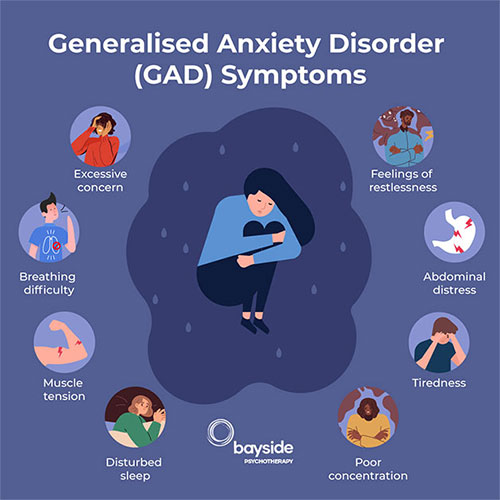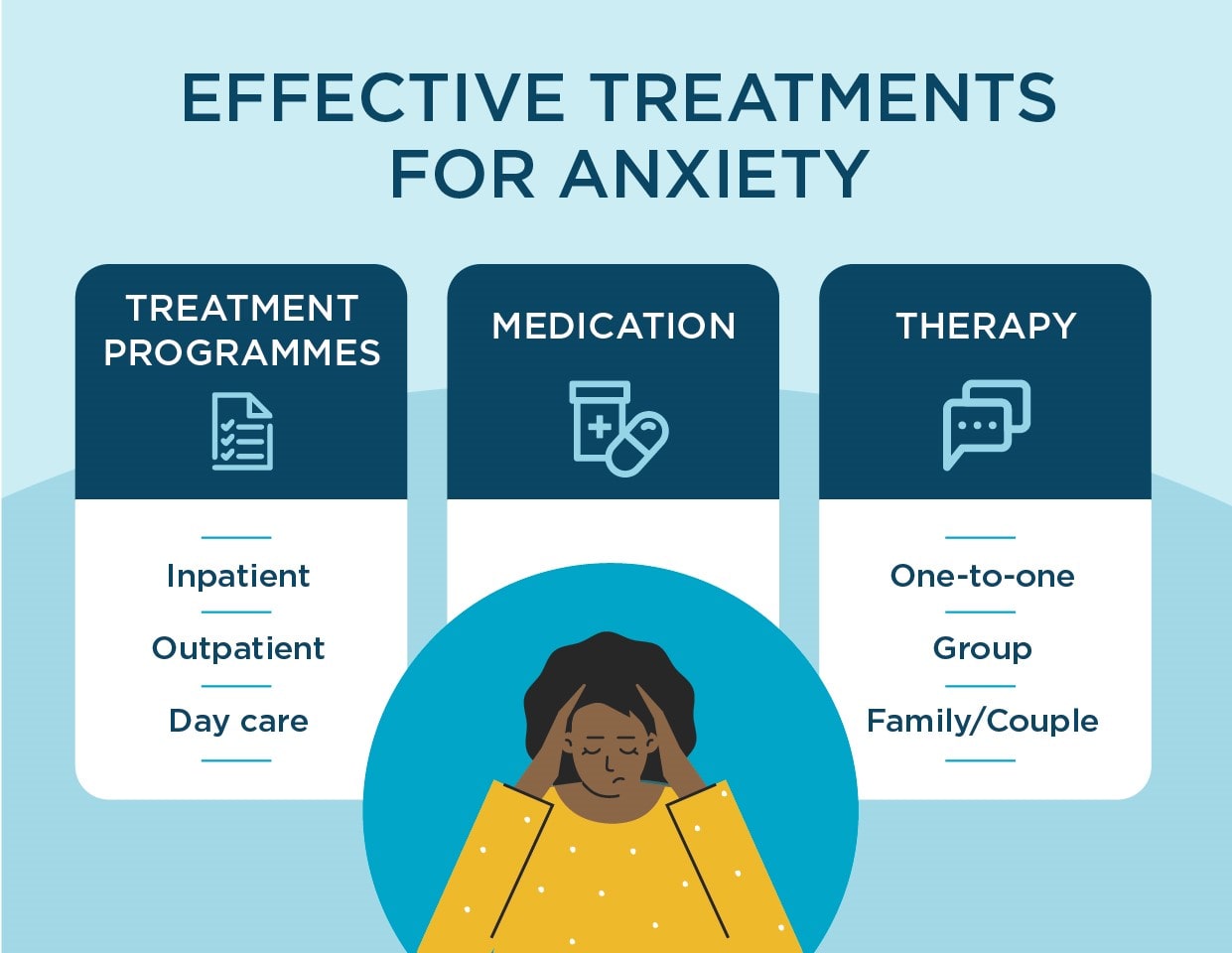Take the first step toward healing with therapy for anxiety solutions
Exploring Different Strategies in Coaching for Anxiousness Condition for Long-term Modification
When dealing with anxiousness problems, it's essential to explore a selection of counseling strategies. Each approach provides one-of-a-kind understandings and tools to aid you manage your signs and symptoms successfully. You might locate that combining methods can generate the most effective results. Understanding the nuances of these strategies is essential to cultivating lasting change. What happens if the ideal combination could launch a new level of emotional well-being for you?
Recognizing Anxiousness Conditions: A Quick Introduction
Anxiety conditions, which impact millions of individuals worldwide, can considerably impact day-to-day live. You could experience overwhelming sensations of concern or fret that appear unmanageable. These sensations can lead to physical signs and symptoms like a racing heart, sweating, or perhaps lightheadedness. Typical kinds of stress and anxiety disorders consist of generalised stress and anxiety disorder, panic attack, and social anxiety condition. Each has one-of-a-kind signs, yet they all share a propensity to disrupt your routine and relationships.Understanding the source of your anxiousness is essential. It could stem from genes, mind chemistry, or life experiences. Acknowledging your triggers can help you handle your actions better. It's vital to bear in mind that you're not the only one in this struggle. Lots of people encounter similar obstacles, and seeking aid is a solid step towards feeling better. By discovering anxiety problems, you're currently on the path to understanding and handling your condition much more properly.
Cognitive-Behavioral Treatment: Testing Adverse Idea Patterns

Determining Unfavorable Thought Triggers
When you experience moments of distress, recognizing the details triggers behind your negative thoughts can be essential in taking care of anxiety. Start by paying attention to scenarios that prompt feelings of concern or concern. Is it a congested space, a forthcoming deadline, or a conversation with specific people? Write these circumstances in a journal. This will certainly assist you determine patterns in your thinking. Also, notice physical sensations that accompany your unfavorable ideas, like an auto racing heart or rigidity in your chest. By pinpointing these triggers, you obtain insight into what's fueling your anxiety. Understanding these connections is the initial step in challenging those ideas and ultimately reclaiming control over your emotional responses.

Changing Thoughts With Positives
Challenging unfavorable thought patterns is a necessary step in transforming your way of thinking and decreasing anxiety. You might typically discover yourself trapped in cycles of insecurity or disastrous thinking. As opposed to allowing these ideas determine your feelings, technique replacing them with sensible options or favorable affirmations. When you assume, "I can not handle this," shift it to, "I can manage obstacles one step at a time." This easy change can considerably influence your emotional state. Frequently determining and responding to these negative ideas aids create a much healthier internal dialogue. Bear in mind, it takes some time and initiative, yet consistently exercising this strategy can cause enduring adjustment, empowering you to face anxiousness with renewed self-confidence and resilience
Structure Coping Methods With Each Other
Replacing adverse thoughts is only the beginning of handling anxiety efficiently. To produce enduring adjustment, you need to construct coping approaches that encourage you. Cognitive-Behavioral Therapy (CBT) aids you recognize and challenge those unhelpful thought patterns. Together, you and your therapist can explore just how these thoughts influence your sensations and behaviors.Start by establishing practical techniques, like journaling or mindfulness workouts, that enable you to challenge stress and anxiety head-on. When you encounter your concerns gradually, you'll learn to respond in a different way.

Mindfulness and Acceptance-Based Approaches: Cultivating Present-Moment Awareness
As you navigate the intricacies of anxiousness, incorporating mindfulness and acceptance-based methods can significantly enhance your capability to cultivate present-moment understanding. By concentrating on the present moment, you'll find that you can observe your thoughts and sensations without judgment. This practice helps you acknowledge your stress and anxiety without really feeling overwhelmed by it.Engaging in mindfulness workouts, such as deep breathing, body scans, or led meditations, enables you to ground yourself in your existing experience. Acceptance-based methods urge you to welcome your feelings rather than deal with against them. They shed their power over you.Incorporating these methods into your everyday routine can change how you respond to anxiousness when you approve your sensations. You'll develop durability and discover to browse stressful situations with higher ease. Eventually, cultivating present-moment awareness lays the foundation for lasting modification, empowering you to lead a much more fulfilling life.
Exposure Therapy: Facing Worries Gradually
Exposure therapy aids you challenge your fears in a progressive method, making it less overwhelming. You'll discover techniques to face anxiety-provoking scenarios detailed, while also developing coping approaches to manage your reactions. This strategy encourages you to take control and lower anxiousness over time.
Steady Direct Exposure Techniques
When facing stress and anxiety, gradually facing your concerns can be a powerful method to gain back control. This technique, recognized as steady exposure, entails gradually subjecting on your own to the circumstances or items that cause your anxiety. Begin with much less daunting circumstances and gradually work your means approximately even more tough ones. For example, if you hesitate of public talking, you may begin by talking before a mirror, then proceed to sharing thoughts with a good friend, and at some point deal with a little team. Each action aids desensitize you to the fear, constructing your confidence over time. Bear in mind, it's crucial to pace yourself and celebrate tiny triumphes as you move through this process, reinforcing your ability to take care of anxiety successfully.
Structure Coping Approaches
Structure reliable coping strategies is necessary for handling anxiousness, particularly as you face your anxieties gradually. One powerful technique is exposure therapy, where you begin by encountering your anxieties in a controlled fashion. Start with much less intimidating scenarios and slowly work your method as much as even more tough situations. This gradual direct exposure assists desensitize you to stress and anxiety triggers, making them less overwhelming.Incorporate relaxation methods, such as deep breathing or mindfulness, to relax your mind throughout exposure. Track your progress, commemorating little victories in the process to increase your self-confidence. Keep in mind, it's all right to take your time; the objective isn't perfection but steady renovation. By building these techniques, you'll equip yourself to navigate anxiety and accept life more fully.
Psychodynamic Therapy: Discovering Origin of Stress And Anxiety
Psychodynamic treatment discovers the unconscious mind, revealing the root creates of your anxiety - Counseling services for anxiety. By analyzing your ideas, sensations, and previous experiences, this approach helps you reveal underlying conflicts and unsettled problems that might contribute to your current anxiousness. You'll work with a specialist to explore youth experiences, connections, and psychological patterns that shape your responses today.As you gain understanding right into these much deeper layers of your subconscious, you'll begin to recognize how past events influence your existing habits. This understanding can lead to catharsis, enabling you to process emotions you could have suppressed.Through the restorative partnership, you can additionally recognize defense mechanisms that might have developed over time, supplying a more clear course to alter. Inevitably, psychodynamic therapy furnishes you with the devices to address your anxiousness at its core, promoting lasting change in your psychological well-being
Holistic and integrative Methods: Combining Methods for Greater Effectiveness
Integrating numerous healing strategies can boost your trip toward taking care of anxiousness better. By combining components from cognitive-behavioral therapy, mindfulness techniques, and holistic methods, you can develop a customized technique that addresses your special needs. You might use cognitive-behavioral methods to challenge adverse idea patterns while incorporating mindfulness workouts to ground yourself in the existing moment.Additionally, checking out all natural techniques such as yoga exercise or reflection can promote leisure and lower stress and anxiety symptoms. This mix enables you to create higher self-awareness and resilience.Experimenting with these varied approaches can aid you discover what resonates most with you. Remember, it has to do with discovering a synergy that works, as opposed to adhering to a single technique. This integrative method not only supplies instant relief yet additionally cultivates long-term check here skills for managing anxiousness, encouraging you to redeem control over your life.
The Duty of Assistance Systems: Structure Resilience Through Link
While it may seem that taking care of anxiousness is a singular trip, having a strong support group can play a necessary function in your resilience. Surrounding on your own with compassionate buddies, family, or support system produces a secure space where you can openly share your experiences and feelings. You remind yourself that you're not alone in this struggle.These connections use inspiration and can supply useful coping approaches that have functioned for others when you link with others. It's also a possibility to gain point of view; pals can assist you see situations in a different way, lowering feelings of isolation.Moreover, psychological support cultivates a feeling of belonging, which can significantly relieve anxiety symptoms. By leaning on your assistance system, you can build strength and deal with difficulties much more successfully. Bear in mind, getting to out for assistance is an indication of strength, and it can make all the difference in your trip toward taking care of anxiousness.
Regularly Asked Questions
What Are the Common Signs And Symptoms of Stress And Anxiety Conditions?
You may experience restlessness, fatigue, trouble focusing, impatience, muscle stress, and sleep disruptions. Physical signs and symptoms can include rapid heartbeat, sweating, and shivering. Identifying these indicators early can help you look for appropriate support and therapy.

How Lengthy Does Treatment Usually Last for Stress And Anxiety Problems?
Therapy for anxiousness conditions normally lasts anywhere from a few weeks to a number of months. It really relies on your private needs, development, and the techniques your therapist uses to aid you handle your anxiety properly.
Can Drug Be Made Use Of Along With Treatment for Stress and anxiety?
Yes, drug can certainly be used along with therapy for anxiousness. Incorporating both approaches usually improves therapy effectiveness, assisting you handle signs and symptoms while checking out underlying problems through counseling. Constantly consult your doctor for personalized advice.
Are There Self-Help Approaches for Taking Care Of Anxiety?
Yes, there are a number of self-help methods for taking care of anxiety. You can practice mindfulness, take part in regular exercise, preserve a balanced diet plan, establish a regular, and use deep breathing strategies to assist lower anxiousness symptoms effectively.
Exactly how Do I Know if I Need Professional Help for Anxiety?
You should take into consideration seeking professional assistance for anxiousness if it interferes with life, triggers substantial distress, or if self-help strategies aren't functioning. Trust your instincts; connecting can cause far better coping abilities and support. Typical kinds of stress and anxiety conditions include generalised anxiousness condition, panic condition, and social anxiousness condition. When you encounter minutes of distress, recognizing the details triggers behind your negative thoughts can be important in taking care of stress and anxiety. Replacing unfavorable ideas is only the start of taking care of anxiety efficiently. By examining your ideas, sensations, and previous experiences, this strategy aids you discover underlying problems and unsolved concerns that might contribute to your current anxiousness. It's additionally a possibility to obtain perspective; friends can help you see situations differently, decreasing sensations of isolation (Counseling services for anxiety).Moreover, emotional support cultivates a sense of belonging, which can significantly alleviate anxiousness signs